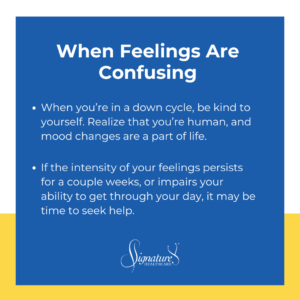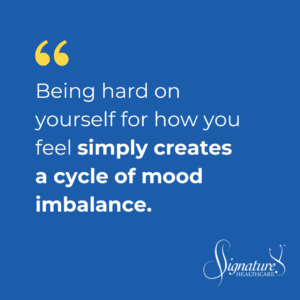Be Kind to Yourself: How to Manage Anxiety or Depression
Many people struggle with anxiety disorders, depression, or mood swings. These struggles have plagued humans for as long as we’ve walked the earth. But it’s never been as pronounced or discussed as in the modern age.
While we’ve long known isolation fosters mood disorders, the COVID pandemic made all of us more acutely aware of it. And even though the touch of a button can connect us with someone literally across the globe, many people still feel lonely and isolated from others.
Compound that with never-ending stressors and the uncivil discourse that clouds our TVs, cellphones, and social media, and it’s a toxic soup for anxiety, anger, or depression.

When Feelings Are Confusing
More often than not, there’s a situational cause for our feelings — something we can point to — like seasonal change, unemployment, illness, or the loss of a loved one. At other times, though, sad or bad feelings emerge seemingly out of nowhere.
This can frustrate patients: “Why do I feel this way for no reason? And why can’t I snap out of it?” They often blame themselves, as if they’re “weak” or should be able to “will themselves” out of fearfulness, anger, or the blues.
It never serves you to do this: Being hard on yourself for how you feel simply creates a cycle of mood imbalance.
Your emotional health is like your physical health: It’s dynamic. We each experience waves of emotional change, of “up” or “down” feelings:
- When you’re in a down cycle, be kind to yourself. Realize that you’re human, and mood changes are a part of life.
- If the intensity persists or if it impairs your ability to get through your day, it may be time to seek help.

Myths Get in the Way
There’s a lot of misinformation about mental health. Here are two myths we see and hear regularly:
Myth #1: Women are better than men at recognizing when they need help and considering options.
The reality: Many men do realize they could use some help. But unfortunately, they often fear it’s a sign of weakness to talk about feeling blue or anxious. If you’re a male having trouble getting through your day, whether at work or at home, it’s more than okay to ask for assistance!
Whatever your gender, Signature Healthcare encourages you to offer yourself kindness, acknowledge your need, and explore how to improve your situation.
Myth #2: A strong person doesn’t need medication to stop feeling down.
The reality: Certain medicines can and do help when other interventions are ineffective. Temporarily taking a proven medication prescribed by your doctor isn’t a flaw; it means you’re taking good care of yourself.
There are many ways to help manage mild to moderate anxiety or depression without having to reach for a prescription medication. Your Signature Healthcare doctor may, however, recommend you try a prescription for the next few months. It can give you the energy to move forward and explore some of the other actions you can take to improve how you feel.
Then, as your moods stabilize, we work with you to reduce your dosage gently and gradually. And if anxiety or the blues occasionally return, you can feel confident there’s a trusted medication to get you back on track, should other interventions not be successful. In this regard, the medication can be seen as a safety net.
Daily Practices Can Help
Conventionally, medical science felt that imbalanced moods come from a biochemical change affecting the way we think. But today, many specialists believe the opposite: that how we think may drive biochemical change within our brain.
So, for many of us, it may be possible to improve our moods by changing our perspective. Here are a few interventions that may relieve anxiety or chronic sadness:
- Take a few moments to pause during your busy day — perhaps during lunch or between meetings. Carve work-free periods into your week to enjoy the outdoors or chat with a friend.
- Put aside your screens and look at the stars in the sky. Notice the beauty around you and breathe for a moment.
- View or listen to programs that inspire you or make you laugh.
- Associate with people who make you smile and feel good, not those who bring you down.
- Eat mindfully, avoiding foods that, over time, create a harmful inflammatory response within the body.
- Make it a priority to get a good restful night’s sleep.
- Move your body — perhaps the single best way to curtail anxiety and depression! Hit the gym, walk, dance, or garden. Any consistent form of movement can improve your mood significantly (and help you sleep well).
- Explore a gentle meditation practice, yoga, tai chi, or guided imagery tapes. These approaches don’t necessarily require you to assume difficult poses or sit and meditate for hours. You can even benefit from a brief one-minute meditation or a gentle, mindful stretch. Yoga, especially, is more than an opportunity to enhance physical flexibility. Individualized yoga therapy can enhance flexibility of body and mind.
- Certain adaptogens — herbs, roots, and other plant substances — can potentially restore some balance within your mind and body. Consult your integrative medicine specialist to ensure you choose something safe that will not interact with prescription drug therapy, and that you use the correct dose.
- For some people, other treatments, including acupuncture and massage therapy, can help balance physical, emotional, and spiritual energy throughout the body.
Acknowledge Your Symptoms
Many people choose to mask their feelings of emotional imbalance, rather than seek out the root cause. They participate in risky behaviors or use alcohol, drugs, or even cigarettes to numb or obscure anxious or depressed feelings. But hiding in this way doesn’t help in a meaningful way.
If you’re chronically down or stressed, or if mood shifts are affecting your daily activities, understand that you are not alone and that you need not suffer. If you’ve tried to find joy engaging in different activities and yet still feel out of sorts, there is at least one other effective intervention to consider — working with a good therapist.
It’s a widely accepted and encouraged approach (and frankly, most people — regardless of how they feel — benefit from working with a counselor).
A well-trained, trusted therapist doesn’t “find issues” or tell you how to “fix” yourself. Rather, they hold up a mirror that helps you see your circumstances, and yourself, in a new light. Then together you can explore ways to balance and enhance your emotions so you can better enjoy your best life.
It all begins with being kind to yourself. At Signature Healthcare, we’re standing by for you. Let us know how we can help.

Dr. Russ Greenfield
Dr. Greenfield was among the first physicians to train under the direct guidance of Dr. Andrew Weil and has been practicing Integrative Medicine for over 25 years. He is Board Certified in Emergency Medicine and Lifestyle Medicine.

